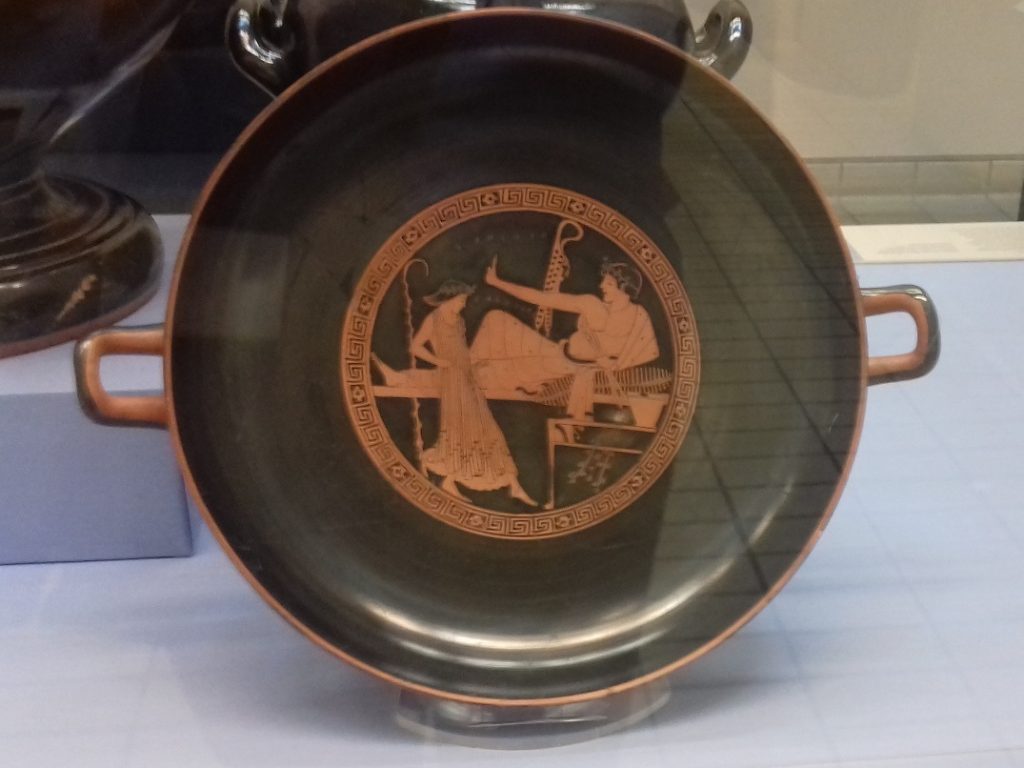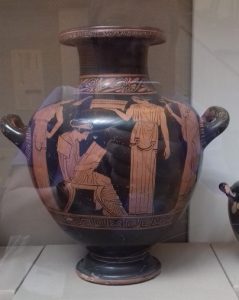As I’ve mentioned before, writing any historical fiction means establishing what modern scholars know, and crucially, what we don’t know. Writing a murder mystery set against the backdrop of the Great Panathenaia presents a particularly interesting challenge.
We know it was one of the greatest panhellenic occasions. Every four years, the three days of the annual city festival to honoured Athena was extended into eight days of sporting competitions, musical contests and sacred rites to celebrate Attica’s good fortune, blessed by their patron goddess. Visitors came from right across the Hellenic world to watch or to take part.
Athletes ran races of various lengths, in different age classes. Pentathletes competed in the long jump, discus and javelin throw, a sprint and a wrestling match. For those with a taste for more physical confrontation, there was boxing, wrestling, and the no-holds-barred pankration where deaths were not unheard of – and that didn’t necessarily disqualify a contestant. Equestrian events included chariot and horse races, while rowers raced their triremes across the bay at Piraeus.
There were competitions for singers, solo and accompanied, as well as for lyre players and those who played the twin pipes called the aulos. Both the Iliad and the Odyssey were performed in their entirety, in what was also a contest for the rhapsodes*. These performance poets in their brightly coloured cloaks~ specialised in the great epic tales that were the popular entertainment of the day. The victors in all these sporting and artistic competitions won a garland of olive leaves, as well as a quantity of sacred and extremely valuable olive oil in specially decorated amphorae.
Then there were the contests specifically for Athenians, between teams drawn from the voting tribes made up from city, country and coastal districts. Designed to foster the unity that was as essential for democracy as it was on the battlefield, these culminated in an evening relay race where flaming torches were passed from hand to hand. After a night of festivities up on the Acropolis, the Great Panathenaic procession made its way through the city to honour Athena’s most ancient statue in her temple.
What a great setting for a crime novel? There are so many possibilities, with so much going on! Yes, but… we may know what was happening, but we really don’t know a lot about how these events were organised. As far as the Athenians and everyone else were concerned, the details were common knowledge, and people rarely bother writing such things down. By the time someone realises crucial information has been forgotten, it’s usually too late to retrieve it.
Where do scholars find the details that I’m going to need for this book? Remember those special panathenaic amphorae? They were produced in vast quantities, along with smaller souvenir replicas, all decorated with officially sanctioned designs including portrayals of competitions. A fair few of those have survived, along with other ceramics with relevant images. Archaeologists have uncovered the starting blocks for a sprinters’ racetrack in the agora as well as stones with inscriptions listing the prize winners in the different contests. These may not be complete, but they offer further useful information. Memorials and other statues give us additional clues, most notably the carved frieze of the Parthenon which is generally reckoned to show a stylised Great Panathenaic procession. Literary sources here and there make passing references that add a bit more to the picture.
So we do have quite a few pieces of this puzzle, even if we don’t have the equivalent of the jigsaw box lid. There are still plenty of gaps though. This is where historians and novelists alike start to get creative. When it comes to the practicalities of performing Homer’s epic poems in their entirety, scholars have been trying that out for themselves, as well as examining the written texts from this new perspective, and getting input from modern actors and poets. I’ve found reading their conclusions and looking at these performances absolutely fascinating. We can also look at events like the modern Olympics and festivals such as Glastonbury, and consider how people interact with those. How far can we use those events as a template? Well, when we look at the surviving dramas from these same decades of the 5th century BCE, there’s good reason to believe that people then and now have plenty in common.
So while no one knows for certain how the Great Panathenaia unfolded over these eight days, the hard work of countless experts has meant I can put together one plausible version that offers a dramatic setting for this new murder mystery – as well as creating some very interesting challenges for Philocles as he attempts to find a killer.
* Yes, the early working title for this book was ATHENIAN RHAPSODY
~ Those performing the Iliad wore red cloaks to reflect the bloodshed of the war at Troy. Those performing the Odyssey wore cloaks to symbolise the endless seas … so would their recital be … rhapsody in blue?


